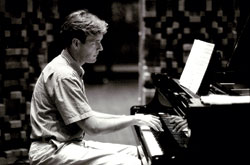Peter Serkin
For a musical style over a half-century old, high modernism—the angular, gnarly, rhythmically complex, nontonal idiom that took up where pioneers Schoenberg and Webern left off—still fuels debate. Not just for the validity of the style itself, but for its role in our musical culture: Did academic modernist composers like Elliott Carter, Charles Wuorinen, and Milton Babbitt put university music departments in a decades-long stranglehold, demanding conformity from their students, openly hostile to other styles? Did their listener-unfriendly music alienate casual classical fans, making them suspicious of all new music and driving them from the concert hall? Have they, in fact, hastened the Death of Classical Music™? Well, pianist Serkin’s having none of it. He’s championed the most difficult contemporary composers throughout his career, and is bringing shorter pieces by two of them, Carter and Wuorinen, to Benaroya Hall later this month as astringent palate cleansers on an eclectic recital program containing plenty of music you’ll hardly hear anywhere else in Seattle: Little Sketches of Birds by mystical French colorist Olivier Messiaen opens, followed by a Bach Capriccio (beginning with an almost gospel-sounding chorale and ending with a fugue based on bugle calls) and Brahms’ weighty Variations on a Theme by Handel. Benaroya Hall, Third Avenue and Union Street, 215-4747, www.seattlesymphony.org. $22–$73. 7:30 p.m. Wed., Feb. 28.
Falstaff
If ever a composer was guaranteed a smash hit, it was Verdi at the 1893 premiere of his opera Falstaff, which he more or less knew would be his last. He’d ruled Italian opera (which was not too far from ruling Italy itself) for a half-century, not just a beloved artist but a national hero. The audience and critical success was expected, but the piece itself was a surprise—a sparkling, boisterous comedy, of all things, from this master of tragedy, based on Shakespeare’s The Merry Wives of Windsor and centering on the larger-than-life “fat knight” who gets his comeuppance when he tries to woo two (married) women at once. And just as he’d capped his career with a joke, Verdi saved the best laugh in the opera for last. After the couples are paired off and all is forgiven, the cast turns to the audience and sings “Tutto nel mondo e burla”—all the world’s a joke, man is born a fool; the music sweeps everyone into the joyous, affectionate embrace of a man who’d rendered in his art, as powerfully as anyone before or since, the emotions and frailties that make us human. Falstaff is this season’s production for Seattle Opera’s Young Artists Program; their fresh, eager, theatrically alive performances, especially in ensemble comedies, are an annual don’t-miss. Meydenbauer Center, 389-7676, www.seattleopera.org. $15–$35. March 30–April 7.
Jake Heggie
In their ninth season, Music of Remembrance have made “never forget” their motto, presenting music by European composers who either fled or fell victim to the Holocaust, as well as works on the subject by contemporary composers, many commissioned and premiered by MoR. Of course, the Nazis’ murderous prejudices were not only ethnic: It’s believed the Third Reich was responsible for the deaths of 15,000 German gay men, resulting in the destruction of a flourishing and vibrant between-the-wars gay culture. I’d been wondering if and how MoR were going to address this aspect of the Nazi era when they announced their commission, from busy San Francisco composer Jake Heggie, for a new song-cycle on the subject, For a Look or a Touch. Seattle Opera’s 2005 production of his The End of the Affair showed him to be a composer of lyrical power (singers love his smoothly tailored lines) and dramatic savvy. Benaroya Recital Hall, Third Avenue and Union Street, 365-7770, www.musicofremembrance.org. $25. 7:30 p.m. Mon., May 7.
‘Bridging the 48th Parallel’
It’s been hard to complain about Gerard Schwarz’s neglect of postwar European music in his Seattle Symphony programs when he’s paid significant and welcome attention to American music of the same period. But there’s been a lot going on over there (in addition to Shostakovich, one of his personal favorites) on which we’ve largely missed out. The SSO’s annual spring festival, this year called “Bridging the 48th Parallel” and focusing on music from Central Europe, will be a step in the right direction. Two imposing and dazzlingly colorful pieces, Bartók’s opera Bluebeard’s Castle (in concert performance) and Janácek’s Glagolitic Mass, anchor two concerts, surrounded by newer works from some very intriguing composers very rarely heard in Seattle: György Kurtág, whose music is delicate and powerfully intimate; Karel Husa, an eloquent spokesperson for Czechoslovakia during its years under the Soviet thumb; Witold Lutoslawski, conjuror of innovative orchestral soundscapes; and Andrzej Panufnik, composer of several stark and arresting symphonies. An auxiliary concert by the Seattle Chamber Players (June 3), entitled, “After Bartók: What’s Next?” offers Kurtág’s ethereally romantic Hommage á R. Sch. (Robert Schumann, that is). Benaroya Hall, Third Avenue and Union Street, 215-4747, www.seattle symphony.org. May 31–June 8.







